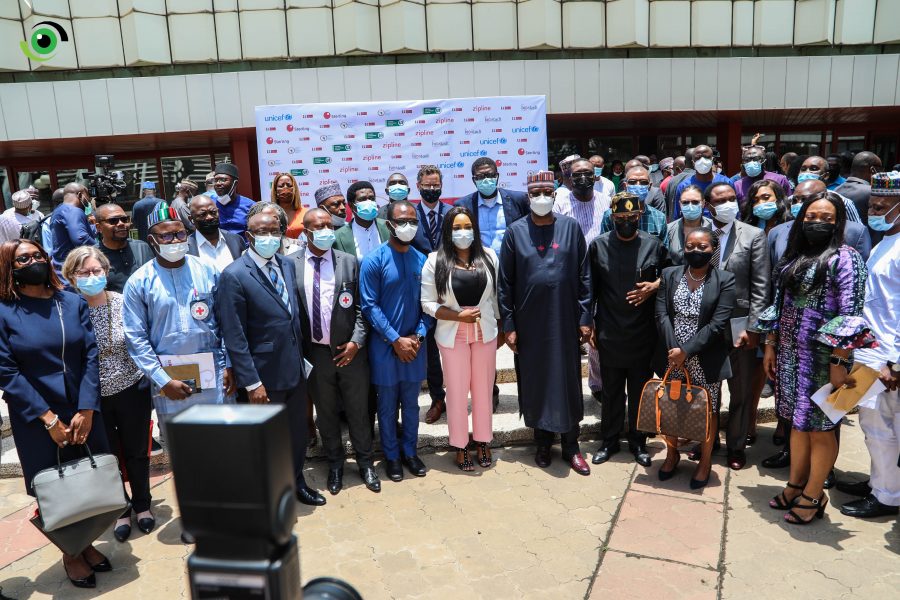The COVID-19 pandemic not only exposed weaknesses in global health systems, it also provided us with an opportunity to course-correct and build more resilient health systems that will ensure health security for all. Taking advantage of this opportunity, on September 2 and 3, 2021, the Nigeria Health Commissioners Forum convened a 2-day meeting with the theme ‘Building a Stronger Health Sector in Nigeria Through Collaboration and Strategic Partnership’. The objective of the meeting was to encourage increased engagement and collaboration between the leadership of the health sector at the national and sub-national level and development partners, to strengthen the health sector at the sub-national level.
The Nigeria Health Commissioners Forum is a platform of all the 36 Commissioners for Health and the Secretary of Health of the Federal Capital Territory (FCT), which promotes cross-state collaboration, experience sharing and learning to foster national and sub-national development. The overarching goal of the Forum is to accelerate the attainment of Universal Health Coverage (UHC) in each of the states for better health outcomes.
The Critical Role of a Health Commissioner
Speaking during the opening ceremony, Dr Betta Edu, Honourable Commissioner for Health, Cross River State and Chairman of the Forum said that although impressive health policies were being developed and implemented at the national level they were not being replicated in the states. “We are here to discuss the way forward for the health sector at the state level. We will not see changes in our health indices if states are not actively involved,” she said.
In his speech, Asishana Okauru, Director General, Nigeria Governors’ Forum (NGF) Secretariat discussed the NGF’s commitment to health which has become a fixture on the agenda at their monthly meetings. “The Secretariat has maintained a deep engagement with National and State Ministries, Departments and Agencies. The Honourable Commissioners for Health are central to this engagement,” he added.
Addressing the room, Dr (Senator) Adeleke Mamora, Honourable Minister of State for Health said the event was planned at a crucial time, “particularly as we are in the middle of a pandemic”. He also discussed the doctor’s strike and the brain drain of the healthcare workforce, “We are mindful of the ongoing industrial action and the massive loss to the people and government resulting from this action. We are expediting actions and strategies to address the current mass exodus of our skilled health workers”.
Declaring the meeting open, Boss Mustapha, Secretary to the Government of the Federation and Chairman of the occasion praised the collaboration between states and partners as one of the factors behind Nigeria’s successful response to the pandemic. He said, “This is the best time for us as a country to recalibrate our health infrastructure. After COVID-19 you won’t get the kind of attention you are getting now so, seize the opportunity that this provides and do everything you can to ensure that post COVID-19, we will have better medical infrastructure in the country”.
One salient point that reflected in the words of every speaker was the fact that Health Commissioners are major pillars in the health sector and are critical for achieving health objectives at the state level. In the words of Dr Edu, “The patients are in the states, the work is the states. State Health Commissioners must show more commitment.”
Collaborations and Strategic Partnerships
On the second day of the meeting, the Commissioners participated in a lively interactive session where key issues affecting health in their states and the health system as a whole, ranging from governance, health systems strengthening, emergency medical services, human resource for health, supply chain management, health insurance and health financing were examined, and recommendations proffered.
Presentations were received from Federal Ministries, Departments and Agencies and private sector organisations like the World Bank, Nigeria Centre for Disease Control (NCDC), Bill & Melinda Gates Foundation, UNICEF, Nigeria Health Watch and others. In her presentation, Dara Ajala-Damisa, Programme Manager at Nigeria Health Watch, citing the Giving Birth in Nigeria project, discussed Nigeria Health Watch’s unique positioning as an organisation with the expertise needed to identify & examine the challenges being faced in the delivery of quality maternal health care in states because “At Nigeria Health Watch, our advocacy seeks to improve formulation of health policies, allocation of more resources to public health and ultimately working with health authorities to increase accountability and drive impact” she said.
The Forum listed ten areas where urgent support is needed at the state level. These include Leadership and Governance, Communicable and Non-Communicable diseases, Emergency Medical Services, Human Resources for Health, etc. At the end of the meeting, these ‘key asks’ were clearly defined and adopted in a communiqué which will be shared soon.
Health Sector Reform
On Monday, September 6 2021, the Senior Special Assistant to the President, Garba Shehu, put out a press release announcing the creation of a Health Sector Reform Committee with the mandate to commence the development and implementation of a Health Sector Reform Programme for Nigeria, in collaboration with the State Governments and the FCT administration.
Dr. Betta Edu, Chairman, Nigeria Health Commissioners Forum is a member of this committee. This is a welcome development especially as it is coming on the heels of the just concluded quarterly meeting of the Forum.
The Health Sector Reform Committee will undertake a review of all healthcare reforms adopted in the past two decades and lessons learnt and factor them into the development of the new Health Sector Reform Programme. May this be the first of many intentional steps needed to bring Nigeria back from the brink of a national health disaster.
